the kite runner读书报告读后感
《追风筝的人》英语读后感【三篇】

【导语】当仔细品读⼀部作品后,你有什么总结呢?这时最关键的读后感不能忘了哦。
为了让您不再为写读后感头疼,以下是⽆忧考为⼤家精⼼整理的《追风筝的⼈》英语读后感【三篇】,欢迎⼤家阅读。
【篇⼀】《追风筝的⼈》英语读后感 The kite runner was bought by my mother when I was in the sixth grade. The reason is very simple: the plot of the book is exciting, but also because the story in the book is true and shocking. After reading this book, my heart has been washed and shocked. War and ethnic cleansing are so far away in the eyes of Chinese children now, but in East Asia, far away from us, wars continue. Amir and Hassan in the book are brotherly friends, but in fact they are half brothers. Because Hassan is a Hazara, Hassan is very repulsive. (it could also be because of his harelip. The story of Hassan and Amir reminds me of a sentence: a true friend cries when you leave, and a false friend leaves when you cry. In this sentence, its a perfect desc ription. Confidants are honest, and hypocritical friends are indifferent to leave when you need help most. Isnt Amir like that? Even if Amir abused Hassan thousands of times, Hassan would still treat Amir as if he were brothers and brothers, and do him thousands of times.【篇⼆】《追风筝的⼈》英语读后感 I hate wars which make the world bloody ,cold and cruel, so I do not want to talk about the war. But it is miraculous to see a kite is cut off by another one. And the kite which is cut off flies away like a free bird. Hassan said to Amir that for you, one thousand times over. At first, I tought the friendship between Hassan and Amir was so deep. But then I found that Hassan was a servant in Amir’s home and began to realize it is some kind of loyalty. Though Hassan always said that Amir treated him as a friend, deep in his mind, he did not put them on the same line. In his eyes, Amir is the person he should look up to and protect, even do whatever he can do to help. Amir was affluence in material, but he did not have friends because of his race. I dislike him because he always ran away when Hassan was hurted by the others in order to protect him. In my opinion, if he stand up fo Hassan, things would have been different. I could not understand why Amir cheated to make Hassan leave at first, though their “friendship” is complicated. Now I come to know that Amir may try to push Hassan out of the position as a servant. And he wished that they stand in the same line and Hassan can chase for the things wanted by himself. Though Amir’s father said that a boy who won’t stand up for himself, becomes a man who won’t stand for anything, Amir finally turned into a brave man who standed up for Sohrab, the son of Hassan. The kite tied Hassan and Amir tighter tighly. When I saw Hassan running after the kite, I realized that he was chasing for freedom as well. However when I saw Hassan running after the kite, I thought he was learning to protect things he cherished. There are many kites we are willing to have, but do you have the courage to chase for them?【篇三】《追风筝的⼈》英语读后感 This is a wonderful, beautiful epic of a novel. Set in Afghanistan and the United States between the 1970s to the present day, it is a heartbreaking tale of a young boy, Amir, and his best friend who are torn apart. This is a classic word-of-mouth novel and is sure to become as universally loved as The God of Small Things and The Glass Palace. Twelve year old Amir is desperate to win the approval of his father Baba, one of the richest and most respected merchants in Kabul. He has failed to do so through academia or brawn, but the one area where they connect is the annual kite fighting tournament. Amir is determined not just to win the competition but to run the last kite and bring it home triumphantly, to prove to his father that he has the makings of a man. His loyal friend Hassan is the best kite runner that Amir has ever seen, and he promises to help him - for Hassan always helps Amir out of trouble. But Hassan is a Shia Muslim and this is 1970s Afghanistan. Hassan is taunted and jeered at by Amirs school friends; he is merely a servant living in a shack at the back of Amirs house. So why does Amir feel such envy towards his friend? Then, what happens to Hassan on the afternoon of the tournament is to shatter all their lives, and define their futures. The Kite Runner of Khaled Hosseinis deeply moving fiction debut is an illiterate Afghan boy with an uncanny instinct for predicting exactly where a downed kite will land. Growing up in the city of Kabul in the early 1970s, Hassan was narrator Amirs closest friend even though the loyal 11-year-old with "a face like a Chinese doll" was the son of Amirs fathers servant and a member of Afghanistans despised Hazara minority. But in 1975, on the day of Kabuls annual kite-fighting tournament, something unspeakable happened between the two boys. Narrated by Amir, a 40-year-old novelist living in California, The Kite Runner tells the gripping story of a boyhood friendship destroyed by jealousy, fear, and the kind of ruthless evil that transcends mere politics. Running parallel to this personal narrative of loss and redemption is the story of modern Afghanistan and of Amirs equally guilt-ridden relationship with the war-torn city of his birth. The first Afghan novel to be written in English, The Kite Runner begins in the final days of King Zahir Shahs 40-year reign and traces the countrys fall from a secluded oasis to a tank-strewn battlefield controlled bythe Russians and then the trigger-happy Taliban. When Amir returns to Kabul to rescue Hassans orphaned child, the personal and the political get tangled together in a plot that is as suspenseful as it is taut with feeling. The son of an Afghan diplomat whose family received political asylum in the United States in 1980, Hosseini combines the unflinching realism of a war correspondent with the satisfying emotional pull of master storytellers such as Rohinton Mistry. Like the kite that is its central image, the story line of this mesmerizing first novel occasionally dips and seems almost to dive to the ground. But Hosseini ultimately keeps everything airborne until his heartrending conclusion in an American picnic park.。
阅读the kite runner的收获
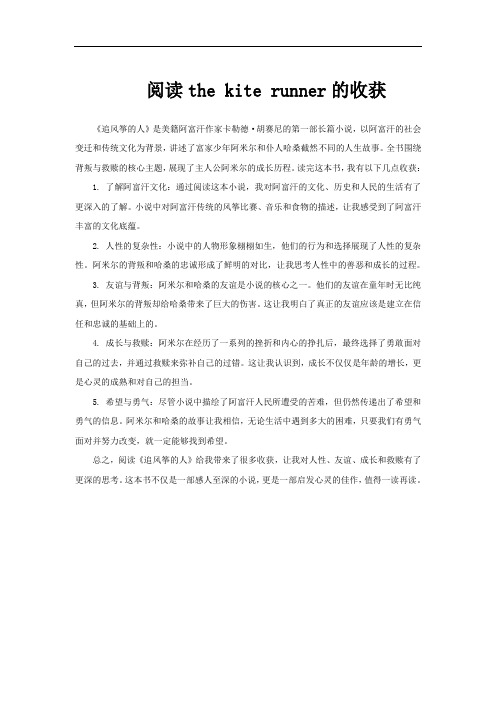
阅读the kite runner的收获
《追风筝的人》是美籍阿富汗作家卡勒德·胡赛尼的第一部长篇小说,以阿富汗的社会变迁和传统文化为背景,讲述了富家少年阿米尔和仆人哈桑截然不同的人生故事。
全书围绕背叛与救赎的核心主题,展现了主人公阿米尔的成长历程。
读完这本书,我有以下几点收获:
1. 了解阿富汗文化:通过阅读这本小说,我对阿富汗的文化、历史和人民的生活有了更深入的了解。
小说中对阿富汗传统的风筝比赛、音乐和食物的描述,让我感受到了阿富汗丰富的文化底蕴。
2. 人性的复杂性:小说中的人物形象栩栩如生,他们的行为和选择展现了人性的复杂性。
阿米尔的背叛和哈桑的忠诚形成了鲜明的对比,让我思考人性中的善恶和成长的过程。
3. 友谊与背叛:阿米尔和哈桑的友谊是小说的核心之一。
他们的友谊在童年时无比纯真,但阿米尔的背叛却给哈桑带来了巨大的伤害。
这让我明白了真正的友谊应该是建立在信任和忠诚的基础上的。
4. 成长与救赎:阿米尔在经历了一系列的挫折和内心的挣扎后,最终选择了勇敢面对自己的过去,并通过救赎来弥补自己的过错。
这让我认识到,成长不仅仅是年龄的增长,更是心灵的成熟和对自己的担当。
5. 希望与勇气:尽管小说中描绘了阿富汗人民所遭受的苦难,但仍然传递出了希望和勇气的信息。
阿米尔和哈桑的故事让我相信,无论生活中遇到多大的困难,只要我们有勇气面对并努力改变,就一定能够找到希望。
总之,阅读《追风筝的人》给我带来了很多收获,让我对人性、友谊、成长和救赎有了更深的思考。
这本书不仅是一部感人至深的小说,更是一部启发心灵的佳作,值得一读再读。
追风筝的人读后感
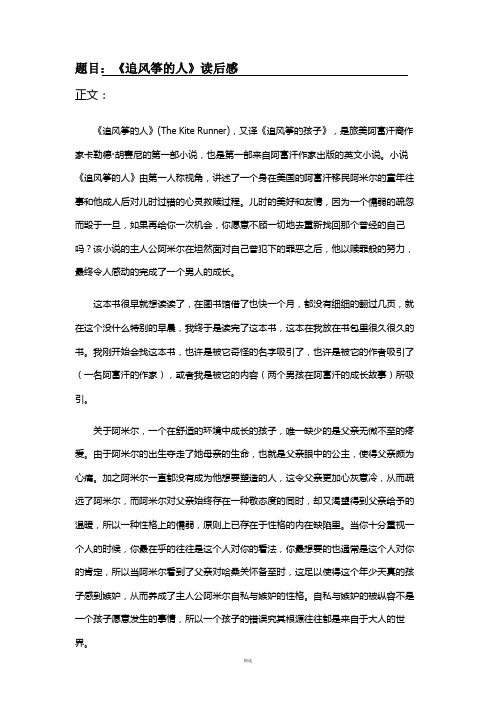
题目:《追风筝的人》读后感正文:《追风筝的人》(The Kite Runner),又译《追风筝的孩子》,是旅美阿富汗裔作家卡勒德·胡赛尼的第一部小说,也是第一部来自阿富汗作家出版的英文小说。
小说《追风筝的人》由第一人称视角,讲述了一个身在美国的阿富汗移民阿米尔的童年往事和他成人后对儿时过错的心灵救赎过程。
儿时的美好和友情,因为一个懦弱的疏忽而毁于一旦,如果再给你一次机会,你愿意不顾一切地去重新找回那个曾经的自己吗?该小说的主人公阿米尔在坦然面对自己曾犯下的罪恶之后,他以赎罪般的努力,最终令人感动的完成了一个男人的成长。
这本书很早就想读读了,在图书馆借了也快一个月,都没有细细的翻过几页,就在这个没什么特别的早晨,我终于是读完了这本书,这本在我放在书包里很久很久的书。
我刚开始会找这本书,也许是被它奇怪的名字吸引了,也许是被它的作者吸引了(一名阿富汗的作家),或者我是被它的内容(两个男孩在阿富汗的成长故事)所吸引。
关于阿米尔,一个在舒适的环境中成长的孩子,唯一缺少的是父亲无微不至的疼爱。
由于阿米尔的出生夺走了她母亲的生命,也就是父亲眼中的公主,使得父亲颇为心痛。
加之阿米尔一直都没有成为他想要塑造的人,这令父亲更加心灰意冷,从而疏远了阿米尔,而阿米尔对父亲始终存在一种敬态度的同时,却又渴望得到父亲给予的温暖,所以一种性格上的懦弱,原则上已存在于性格的内在缺陷里。
当你十分重视一个人的时候,你最在乎的往往是这个人对你的看法,你最想要的也通常是这个人对你的肯定,所以当阿米尔看到了父亲对哈桑关怀备至时,这足以使得这个年少天真的孩子感到嫉妒,从而养成了主人公阿米尔自私与嫉妒的性格。
自私与嫉妒的被纵容不是一个孩子愿意发生的事情,所以一个孩子的错误究其根源往往都是来自于大人的世关于哈桑,那个对阿米尔说出“为你,千千万万遍”的孩子,他心地善良,在他的世界中,没有嫉妒,他对命运是顺从的,甚至是收之一切。
对于他来说,阿米尔是主人,更是不可背叛的朋友和兄弟。
The Kite Runner读后感
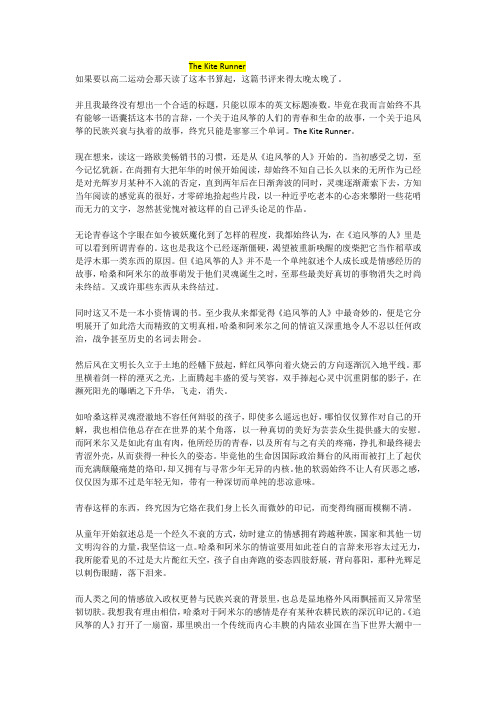
The Kite Runner如果要以高二运动会那天读了这本书算起,这篇书评来得太晚太晚了。
并且我最终没有想出一个合适的标题,只能以原本的英文标题凑数。
毕竟在我而言始终不具有能够一语囊括这本书的言辞,一个关于追风筝的人们的青春和生命的故事,一个关于追风筝的民族兴衰与执着的故事,终究只能是寥寥三个单词。
The Kite Runner。
现在想来,读这一路欧美畅销书的习惯,还是从《追风筝的人》开始的。
当初感受之切,至今记忆犹新。
在尚拥有大把年华的时候开始阅读,却始终不知自己长久以来的无所作为已经是对光辉岁月某种不入流的否定,直到两年后在日渐奔波的同时,灵魂逐渐萧索下去,方知当年阅读的感觉真的很好,才零碎地拾起些片段,以一种近乎吃老本的心态来攀附一些花哨而无力的文字,忽然甚觉愧对被这样的自己评头论足的作品。
无论青春这个字眼在如今被妖魔化到了怎样的程度,我都始终认为,在《追风筝的人》里是可以看到所谓青春的。
这也是我这个已经逐渐僵硬,渴望被重新唤醒的废柴把它当作稻草或是浮木那一类东西的原因。
但《追风筝的人》并不是一个单纯叙述个人成长或是情感经历的故事,哈桑和阿米尔的故事萌发于他们灵魂诞生之时,至那些最美好真切的事物消失之时尚未终结。
又或许那些东西从未终结过。
同时这又不是一本小资情调的书。
至少我从来都觉得《追风筝的人》中最奇妙的,便是它分明展开了如此浩大而精致的文明真相,哈桑和阿米尔之间的情谊又深重地令人不忍以任何政治,战争甚至历史的名词去附会。
然后风在文明长久立于土地的经幡下鼓起,鲜红风筝向着火烧云的方向逐渐沉入地平线。
那里横着剑一样的湮灭之光,上面腾起丰盛的爱与笑容,双手捧起心灵中沉重阴郁的影子,在濒死阳光的曝晒之下升华,飞走,消失。
如哈桑这样灵魂澄澈地不容任何辩驳的孩子,即使多么遥远也好,哪怕仅仅算作对自己的开解,我也相信他总存在在世界的某个角落,以一种真切的美好为芸芸众生提供盛大的安慰。
而阿米尔又是如此有血有肉,他所经历的青春,以及所有与之有关的疼痛,挣扎和最终褪去青涩外壳,从而获得一种长久的姿态。
The kite runner追风筝的人 读后感
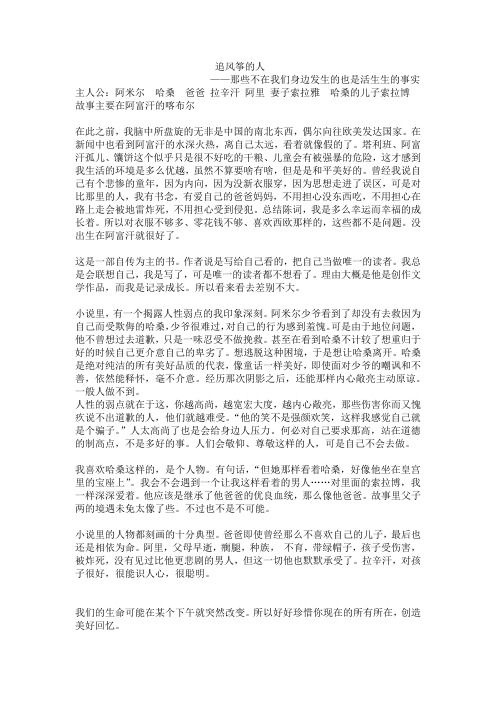
追风筝的人——那些不在我们身边发生的也是活生生的事实主人公:阿米尔哈桑爸爸拉辛汗阿里妻子索拉雅哈桑的儿子索拉博故事主要在阿富汗的喀布尔在此之前,我脑中所盘旋的无非是中国的南北东西,偶尔向往欧美发达国家。
在新闻中也看到阿富汗的水深火热,离自己太远,看着就像假的了。
塔利班、阿富汗孤儿、馕饼这个似乎只是很不好吃的干粮、儿童会有被强暴的危险,这才感到我生活的环境是多么优越,虽然不算要啥有啥,但是是和平美好的。
曾经我说自己有个悲惨的童年,因为内向,因为没新衣服穿,因为思想走进了误区,可是对比那里的人,我有书念,有爱自己的爸爸妈妈,不用担心没东西吃,不用担心在路上走会被地雷炸死,不用担心受到侵犯。
总结陈词,我是多么幸运而幸福的成长着。
所以对衣服不够多、零花钱不够、喜欢西欧那样的,这些都不是问题。
没出生在阿富汗就很好了。
这是一部自传为主的书。
作者说是写给自己看的,把自己当做唯一的读者。
我总是会联想自己,我是写了,可是唯一的读者都不想看了。
理由大概是他是创作文学作品,而我是记录成长。
所以看来看去差别不大。
小说里,有一个揭露人性弱点的我印象深刻。
阿米尔少爷看到了却没有去救因为自己而受欺侮的哈桑,少爷很难过,对自己的行为感到羞愧。
可是由于地位问题,他不曾想过去道歉,只是一味忍受不做挽救。
甚至在看到哈桑不计较了想重归于好的时候自己更介意自己的卑劣了。
想逃脱这种困境,于是想让哈桑离开。
哈桑是绝对纯洁的所有美好品质的代表,像童话一样美好,即使面对少爷的嘲讽和不善,依然能释怀,毫不介意。
经历那次阴影之后,还能那样内心敞亮主动原谅。
一般人做不到。
人性的弱点就在于这,你越高尚,越宽宏大度,越内心敞亮,那些伤害你而又愧疚说不出道歉的人,他们就越难受。
“他的笑不是强颜欢笑,这样我感觉自己就是个骗子。
”人太高尚了也是会给身边人压力。
何必对自己要求那高,站在道德的制高点,不是多好的事。
人们会敬仰、尊敬这样的人,可是自己不会去做。
我喜欢哈桑这样的,是个人物。
《追风筝的人》读书心得体会5篇
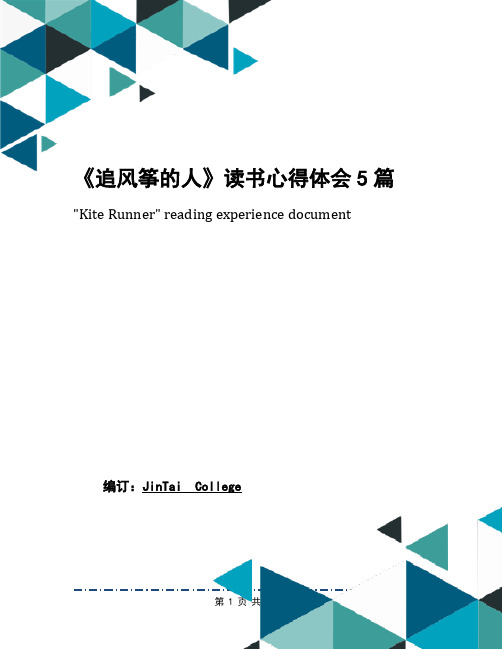
《追风筝的人》读书心得体会5篇"Kite Runner" reading experience document编订:JinTai College《追风筝的人》读书心得体会5篇小泰温馨提示:心得体会是指一种读书、实践后所写的感受性文字。
语言类读书心得同数学札记相近;体会是指将学习的东西运用到实践中去,通过实践反思学习内容并记录下来的文字,近似于经验总结。
本文档根据心得体会内容要求和针对主题是读书学习群体的特点展开说明,具有实践指导意义,便于学习和使用,本文下载后内容可随意修改调整及打印。
本文简要目录如下:【下载该文档后使用Word打开,按住键盘Ctrl键且鼠标单击目录内容即可跳转到对应篇章】1、篇章1:《追风筝的人》读书心得体会2、篇章2:追风筝的人读书心得体会范文3、篇章3:追风筝的人读书心得体会范文4、篇章4:追风筝的人读书心得体会范文5、篇章5:追风筝的人读书心得体会范文篇章1:《追风筝的人》读书心得体会《追风筝的人》讲述了阿富汗少爷阿米尔与他父亲仆人儿子哈桑的故事,作者用朴实无华的文字描写了一个家庭的悲剧。
下面小泰为大家带来了《追风筝的人》读书心得体会650字范文,以供大家阅读参考。
读后心得体会准备看这本书的时候,心中充满了抵触情绪。
因为听闻朋友说,这本书所表达的东西太过沉重,对于我来说真的没有那么大的吸引力,但是在好奇心和豆瓣评分8.9的驱使下,还是看了,果然不负众望。
《追风筝的人》讲述了阿富汗少爷阿米尔与他父亲仆人儿子哈桑的故事,作者用朴实无华的文字描写了一个家庭的悲剧。
12岁的阿富汗富家少爷阿米尔与仆人哈桑情同手足,然而,在一场风筝比赛后,发生了一件悲惨不堪的事,阿米尔为自己的懦弱感到自责和痛苦,逼走了哈桑,不久,自己也跟随父亲逃往美国。
成年后的阿米尔始终无法原谅自己当年对哈桑的背叛,为了赎罪,阿米尔最终战胜懦弱,再度踏上暌违二十多年的故乡,冒着生命危险回到被塔利班占领的喀布尔去解救哈桑的儿子,将他带回美国,收为养子。
《追风筝的人》the kite runner-读后感
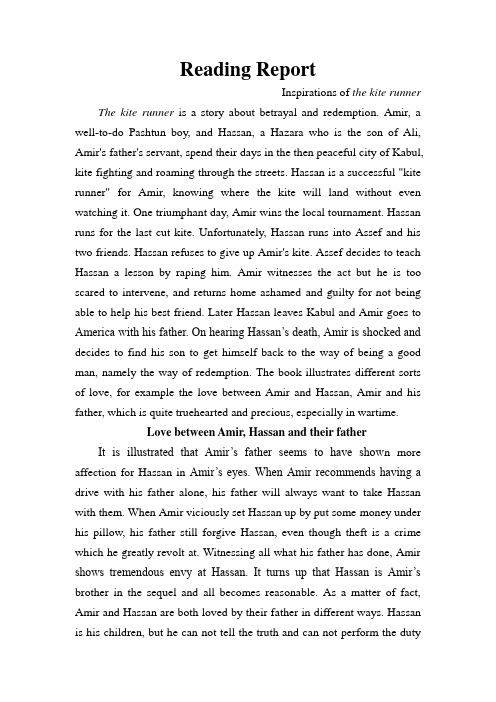
Reading ReportInspirations of the kite runner The kite runner is a story about betrayal and redemption. Amir, a well-to-do Pashtun boy, and Hassan, a Hazara who is the son of Ali, Amir's father's servant, spend their days in the then peaceful city of Kabul, kite fighting and roaming through the streets. Hassan is a successful "kite runner" for Amir, knowing where the kite will land without even watching it. One triumphant day, Amir wins the local tournament. Hassan runs for the last cut kite. Unfortunately, Hassan runs into Assef and his two friends. Hassan refuses to give up Amir's kite. Assef decides to teach Hassan a lesson by raping him. Amir witnesses the act but he is too scared to intervene, and returns home ashamed and guilty for not being able to help his best friend. Later Hassan leaves Kabul and Amir goes to America with his father. On hearing Hassan’s death, Amir is shocked and decides to find his son to get himself back to the way of being a good man, namely the way of redemption. The book illustrates different sorts of love, for example the love between Amir and Hassan, Amir and his father, which is quite truehearted and precious, especially in wartime.Love between Amir, Hassan and their father It is illustrated that Amir’s father seems to have show n more affection for Hassan in Amir’s eyes. When Amir recommends having a drive with his father alone, his father will always want to take Hassan with them. When Amir viciously set Hassan up by put some money under his pillow, his father still forgive Hassan, even though theft is a crime which he greatly revolt at. Witnessing all what his father has done, Amir shows tremendous envy at Hassan. It turns up that Hassan is Amir’s brother in the sequel and all becomes reasonable. As a matter of fact, Amir and Hassan are both loved by their father in different ways. Hassan is his children, but he can not tell the truth and can not perform the dutyof a father. What he can do is to take good care of Hassan as a master. The love he gives to Hassan is like an ocean which goes down so deep. As for Amir, he also loves him. The quality of timidness and recreance in Amir is what his father wants to change, so his father behaves as a little bit cold and indifferent in order to let him learn how to be brave and strong, which is another kind of care and love.Love between Amir and SorayaThe two young people fall in love with each other at the first sight. This kind of love between lovers with the chief band of feeling differs from that between relatives, which makes love more rosy and fantastic. Before a ccepting Amir’s proposal, Soraya has a serious talk with him, telling him that she ever eloped with a man and cohabited with him. She doesn’t hide the mistake she ever made and want to be frank and honest to him. Amir accepts everything for the sake of love. It is precisely love that urges Amir leaves America to meet Ali and then rescue the son of Hassan. He knows she loves him and he can not bury his secret all the lifetime without doing something to make redemption. She will be his backup no matter what happens and what he does. His coming back to Afghanistan is not only redemption of himself, but also redemption of their marriage and love.Love between Amir and HassanThe first word that Amir learns to say is “father”, however, the first word from Hassan’s mouth is “Amir”. Hassan loves Amir without doubt from their childhood to his death. Hassan prepares breakfast and irons the clothes for Amir every morning. Hassan finds the falling kite for Amir every time they fly kite together. Hassan says nothing about what have happened on him when he is finding the kite in the competition which Amir is eager to win. Hassan admits that the money under his pillow is exactly what he steals from Amir without hesitation. Hassan still missesAmir and writes a letter to him even though he himself has left for another place. There is no reduction and end of his love for Amir. If love ceases for the death of Hassan, Amir continues it by the means of redemption. Amir can choose not to go back to visit Ali, not to find Hassan’s son under the risk of death, not to take Hassan’s son back to America under the pressure of blame from his father-in-law and rumblings from his neighbor. Nevertheless, he irrevocably decides to go back and do what he can do. Amir uses the redemption to make up for the mistake he has made and to prolong the love.Amir’s father betrays his mother and his best friend Ali by the love affair between his father and the maidservant. Soraya betrays her father and Amir by the eloping with another man. Amir betrays Hassan by turning a blind eye to tragic experience of Hassan. The mistakes they have made are just like a ghost haunting around them and like a huge stone on their heart putting them out of breath. Aimless, and helpless, they all get lost in the way of life, but what really matters is that they find the way back and find the way to be good again. They weren't the only ones who made mistakes. Everyone can make mistakes and betrayal exists everywhere, which can be forgiven in the name of love if you are desirous to make redemption. Love is the only way of redemption. For you, thousands of times.。
追风筝的人英文读后感

追风筝的人英文读后感After reading "The Kite Runner", I was deeply moved by the powerful and emotional story. The novel, written by Khaled Hosseini, takes readers on a journey through the lives of two young boys in Afghanistan, exploring themes of friendship, betrayal, redemption, and the impact of war on individuals and families.The story is narrated by Amir, a privileged boy from Kabul, and follows his complex relationship with his friend Hassan, the son of his father's servant. The bond between the two boys is tested when Amir witnesses a traumatic event and makes a decision that haunts him for years. The guilt and shame he carries with him shape his life and drive the narrative of the novel.One of the most striking aspects of the book is the way it portrays the impact of historical and political events on the lives of ordinary people. The backdrop of the Soviet invasion of Afghanistan and the rise of the Taliban adds a layer of complexity to the story, highlighting the ways in which larger forces shape individual destinies.Hosseini's writing is both lyrical and evocative, transporting the reader to the streets of Kabul and the desolate landscapes of refugee camps. His descriptions are vivid and immersive, allowing the reader to experience the sights, sounds, and smells of the characters' world.The characters themselves are richly drawn and multi-dimensional. Amir's journey towards redemption is both heartbreaking and hopeful, and his relationship with his father is particularly poignant. The novel also delves into the complexities of friendship, loyalty, and sacrifice, and the ways in which our choices can have far-reaching consequences."The Kite Runner" is a deeply moving and thought-provoking novel that stays with the reader long after the final page. It is a testament to the power of storytelling to illuminate the human experience, and a reminder of the enduring strength of the human spirit in the face of adversity.In conclusion, "The Kite Runner" is a beautifully written and emotionally resonant novel that explores the complexities of human relationships and the impact of historical events on individual lives. Hosseini's storytelling is masterful, and the themes he explores are universal and timeless. I highly recommend this book to anyone looking for a compelling and immersive read.。
- 1、下载文档前请自行甄别文档内容的完整性,平台不提供额外的编辑、内容补充、找答案等附加服务。
- 2、"仅部分预览"的文档,不可在线预览部分如存在完整性等问题,可反馈申请退款(可完整预览的文档不适用该条件!)。
- 3、如文档侵犯您的权益,请联系客服反馈,我们会尽快为您处理(人工客服工作时间:9:00-18:30)。
Brother or Betrayer?-the Kite RunnerI have spent half a month reading The Kite Runner,on the bestseller list as a paperback for 101 weeks. It is the first novel by Khaled Hosseini, who is an Afghan-born American novelist and physician.After graduating from college, he worked as a doctor in California. He has published three novels, most notably his 2003 debut The Kite Runner, all of which are at least partially set in Afghanistan and feature an Afghan as the protagonist. Following the success of The Kite Runner, he decided to stop practicing medicine and became a full-time writer.It tells a story between two boys. A rich boy Amir at the age of 12 and his servant Hasan are brotherly loved. Nevertheless, after a kite game, something miserable happens. Amir feels grievous and guilty for his cowardice and he cannot confront Hassan, using something contemptible to let Hassan and his father leave his home. Not long, Afghanistan breaks out a war, Amir and his father have to flee to America. After his grown-up, he cannot forgive what he had done to Hassan before. And to atone for himself, he returns his hometown, which is destroyed badly by the war. When he comes back, he is astonished by the information that Hassan is his brother and he and his wife have already died. Rahim requests him to rescue Sohrab, the son of Hassan. This time he fights for Sohrab and finally get Sohrab back and takes him to America. Because of many unexpected matters, Sohrab becomes silent and never smiled. Amir regards him as his own son and does everything for him.There are two conflicts roles in this novel, Amir and Hassan, Amir’s father and Ali. The relationship between Amir’s father and Ali is of great similarity with that of Amir and Hassan. Amir’s father is brother and betrayer for Ali while Amir is the same for Hassan. Ali was adopted by Amir’s grandfather the year Amir’s father was born. Naturally, the two boys become childhood playmates just like Amir and Hassan. Amir and Hassan are always told the mischief that his father and Ali used to play. Then after they grow up, Ali becomes the primary servant in the house, spending all his life on serving Amir’s father, until Amir betrays Hassan and they leave. By that time, they have been fully participated in each other’s life for more than forty years. They growup together, have children at the same year, and then they watch their children grow up together. Even with all the racial and social status differences, they care about each other very much. Their relationship is far beyond that between a master and a servant. They are friends, life-mates, and brothers. That’s why when Ali asks to leave with Hassan, Amir’s father feels desperate. He keeps begging Ali to stay, tells him that he is the brother he never has, and he cried, which terrifies Amir because he has never seen his Baba cry for his whole life. From all these it can be seen that he really values his relationship with Ali, regarding his as a brother. Meanwhile, Amir has an intricate relationship with Hassan. He practically spends all his time together with Hassan in their childhood, doing all stuff with him that two best childhood friends would do, like fooling the neighbors, watching movies, playing chess etc. Amir specifically illustrates his special bond with Hassan: ‘Hassan and I fed from the same breasts. We took our first steps on the same lawn in the same lawn in the same yard. And, under the same roof, we spoke our first words. Mine was Baba. His was Amir. My name.’ Hassan has claimed his loyalty to Amir with that first word and with his exclusive line for Amir ‘For you, a thousand times over’. And through all his life, he has never gone back on his words. They are somewhat like brothers and biologically brothers.However, there is no saint in the world. Everybody makes mistakes, so does Amir and his father. They all betray their brothers. There is no doubt that Amir’s father is a righteous man. He is not just a successful businessman; he also has a good heart and a sense of justice. However, such a man of justice has made a serious mistake, one that he cannot compensate with anything. He had sexual intercourse with Sanauber, the wife of his ‘brother’Ali, and had a child with her. This mistake endows him another role, a role of detestable cheater. He has betrayed Ali like Amir betrays Hassan.When Hassan is beaten severely and raped by Assef, Amir witnesses the act but is too scared to intervene. He chooses to betray Hassan. He knows that if he fails to bring home the kite, Baba would be less proud of him. He feels incredibly guilty but knows his cowardice would destroy any hopes for Baba's affections. Afterwards, Amir keepsdistant from Hassan; his feelings of guilt prevent him from interacting with the boy. He plants a watch and some money under Hassan's mattress in hopes that Baba will make him leave; Hassan falsely confesses when confronted by Baba. Although Baba believes "there is no act more wretched than stealing", he forgives him. To Baba's sorrow, Hassan and Ali leave anyway. Amir totally betrays his brother.Both of Amir and his father are tormented by their betrayal. They both feel guilty for what they have done to their brother. Even 20 years later when Amir and his father are in America, his father still aches for separating with them. At the same time, Amir chooses to stay away from Amir and have to lead a life with regret and suffered endless sleepless nights. The only difference between is that finally Amir faces his betrayal. His going back to Afghanistan is not only a journey physically but a journey to atonemen t. Hassan’s son, his nephew saved, Amir’s sin was finally washed. Like the life of circle, Amir ran kite for his miserable nephew. As Hassan did to him, he said “for you, a thousand times over” to Sohrab.Though the book doesn’t give us an accurate ending whether Sohrab came into life again. I am sure love can cure everything. Only when Sohrab lives a happy life as Hassan hoped can Amir’s sin washed up.When I finish reading this book, I also watched the movie. It’s a good movie, but the book is far more majestic than the movie. You will be touched many times just like I do if you read this novel.。
